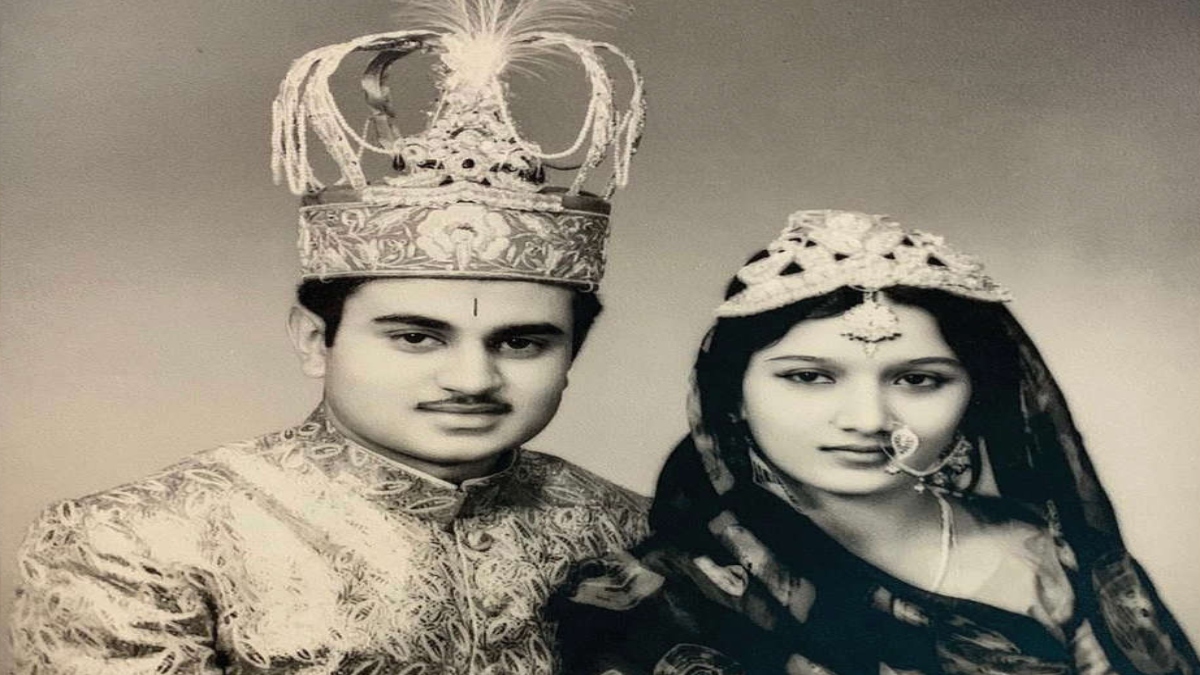


 Second drive for underprivileged children. Keeping malnourishment in mind.
Second drive for underprivileged children. Keeping malnourishment in mind. Late Maharaj Saheb Kanti Dev Singh ji Nagod and his wife Kunwarani Saheba Shashi Mauli Kumari Saheba.
Late Maharaj Saheb Kanti Dev Singh ji Nagod and his wife Kunwarani Saheba Shashi Mauli Kumari Saheba. HH Shri Barmendra Maharaj Shrimant Mahendra Singh Ju Dev Bahadur of Nagod. HH Barmendra Maharani Akhand Soubhahgyawati Shyam Kumari Saheba.
HH Shri Barmendra Maharaj Shrimant Mahendra Singh Ju Dev Bahadur of Nagod. HH Barmendra Maharani Akhand Soubhahgyawati Shyam Kumari Saheba. Princess Lakshika Kumari Nagod carries out a drive for distribution of sanitary pads in a government school.
Princess Lakshika Kumari Nagod carries out a drive for distribution of sanitary pads in a government school. Coat of Arms of Nagod state.
Coat of Arms of Nagod state. Distribution of 2200 sanitary pads by Princess Lakshika Kumari Nagod.
Distribution of 2200 sanitary pads by Princess Lakshika Kumari Nagod. Princess Lakshika Kumari Nagod
Princess Lakshika Kumari Nagod
Princess Lakshika Kumari belongs to the erstwhile princely state of Nagod in Central India. The rulers of Nagod are the Parihar Rajputs, one of the four Agnivansh clans, whose traditional home was Mount Abu. Honoured with 9 gun salutes by the British Government, the rulers were known for communal harmony and always advocated secularism and communal harmony in their state.
Their scion, the petite and pretty Rajkumari Lakshika is not just the custodian of the Nagod family, but also a responsible princess, a philanthropist and a revivalist in her own little way. Schooled from Daly College, Indore and currently pursuing Law, she has been in Nagod, studying remotely through the pandemic.
Living back home at the Nagod Fort, Lakshika has made social service and restoration the mainstay of her life with child and women welfare being the mainstay of her endeavors. “I was moved by the malnutrition that prevailed amongst the local children and the total neglect of personal hygiene amongst young girls. Whilst poverty was the reason behind the first, the latter stemmed from lack of information.”
Lakshika got down to changing the fate of both. She began feeding the very poor and needy children who lived in the tribal villages that surround her farm and ancestral home. Today she not just feeds these children, providing them with food that are a good source of nourishment she also provided them with books, toys and stationery to help them study at home. “We feed them with simple things like Bournvita Milk, glucose biscuits, daal and chawal each day. Also the pandemic has denied them from going to schools. This has directly affected the education of the girl child. Her parents living on the fringe of impoverishment have no money to even buy them books and pens.” Lakshika puts in the family’s funds to help them buy books and stationery, “Even toys to light up their life,” she smiles
As a young, conscientious girl Lakshika also foresaw the importance of menstrual hygiene, teaching sanitation norms to young girls and also lobbying with local manufacturers and the government to make sanitary napkins available to young girls. “The present government, both at the state and national level are committed to menstrual hygiene and I feel teaching hygiene to young girls helps them through life. Not just do they remain healthy but also face fewer issues during their pregnancy etc,” she shares.
Patronising regional craft is integral to royal families and Lakshika too wanted to work in that zone, reviving the long standing tradition of metal craft. She has flagged off a workshop to create utensils, infant complete dinner sets in Kansa or bell metal. “It is a metal found abundantly in our region, shares Lakshika. “Kansa has several theraupeutic benefits. It’s alloy alkalizes and purifies the food and promotes digestive health. Due it’s extraordinary health properties, even Ayurvedic physicians recommend Kansa, for holistic healing stress, relieving and purifying properties. Kansa has the ability to destroy microorganisms making the metal hygenic for use. The water stored in Kansa doesnt become stale and also the metal helps in preventing water borne diseases like diarohea, dysentry, jaundice etc. It also helps in cardiovascular health and beat anemia by regulating blood pressure.”
Just 20 years in age, Lakshika wants to link the development of bell metal with women empowerment, hoping to train women in a craft known best to men. Her dream is to work hard and make rural India a better world. We wish her luck in her journey.